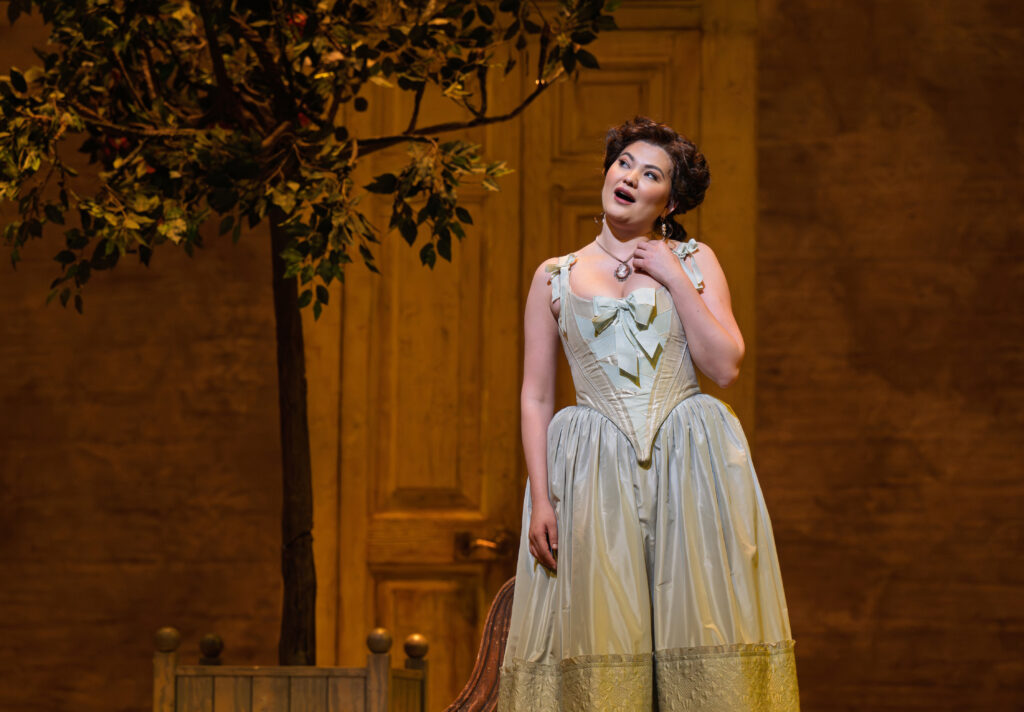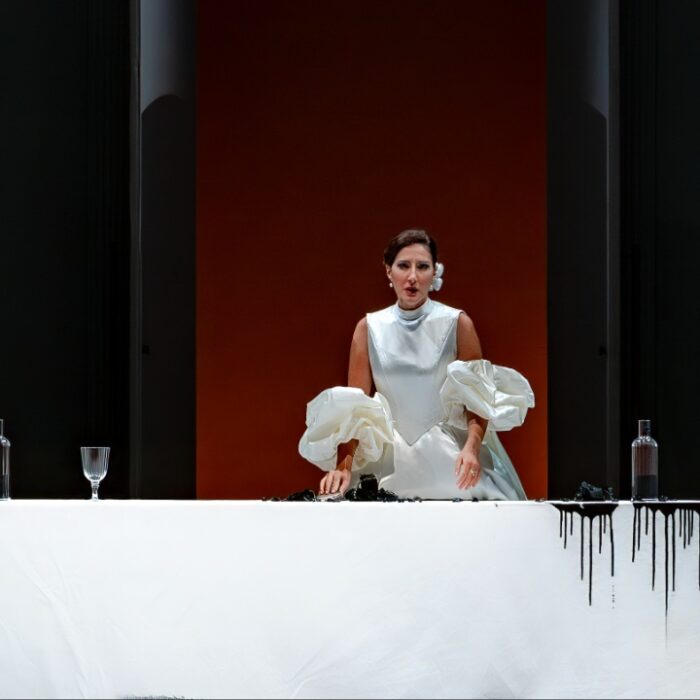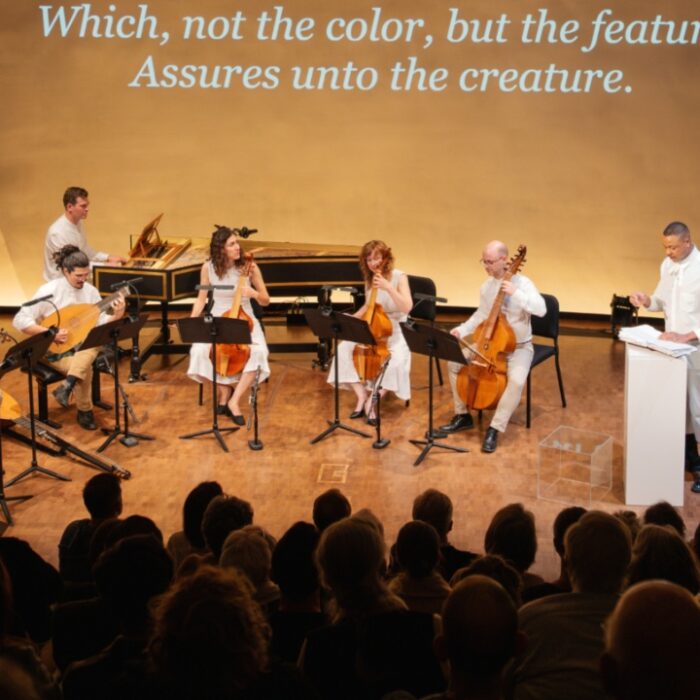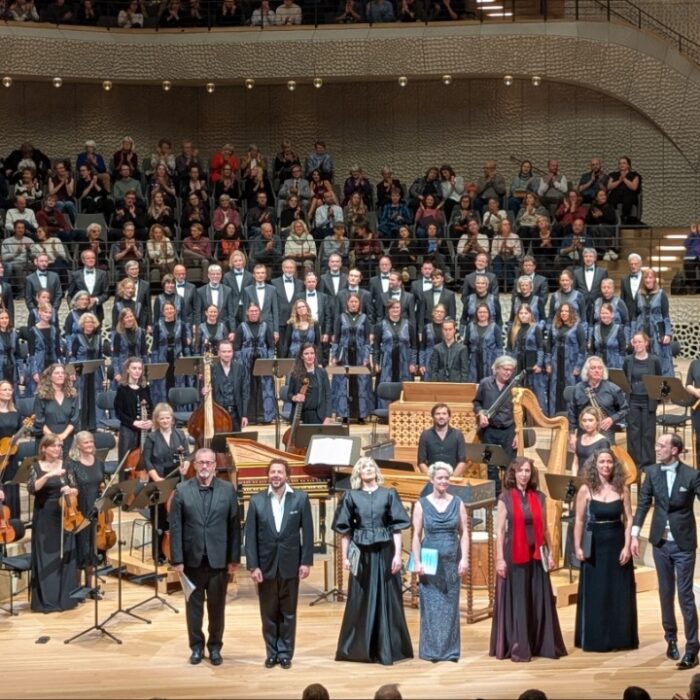
Metropolitan Opera 2024-25 Review: Il Barbiere di Siviglia
Aigula Akhmetshina Leads a Solid Cast in Rossini’s Masterwork
By Francisco Salazar(Credit: Jonathan Tichler / Met Opera)
For the second time this season, the Metropolitan Opera is reviving “Il Barbiere di Siviglia.” Unlike the first cast, which was showcasing several established Met Opera veterans, this second cast featured rising stars.
In many ways, this second revival exemplified the Met’s future and artists who will most likely become established faces on the company’s stage in the coming years. The result was a solid and fun evening of laughter and virtuosic singing.
A Real Winner
Last year, when Aigul Akhmetshina sang Carmen, General Manager Peter Gelb made it clear that he had big plans for the Russian mezzo and that she would be a major star at the Met. If the Carmen didn’t quite make Akhmetshina the Met star Gelb was hoping for, thanks to a poorly directed production, “Il Barbiere di Sivigilia” paid off on his bet in a big way.
From the moment she walked on stage, she brought an allure to her character. She could be feisty in one moment, as in during her interactions with Bartolo, seductive with Figaro and Almaviva, and then vulnerable, especially during Act two when she thinks she has been betrayed. She also brought physicality to the role, dancing and twirling on stage during her opening aria and in the duet with Figaro, and running around with infinite energy during the ensembles.
Vocally, Akhmetshina has a dark, round timbre that seems destined for more lyric roles. While Akhmetshina coloratura is effortless, one could see that it has limitations in the amount of interpolations or variations she gives. Her “Una voce poco fa” was outstanding in showing the roundness of her voice. The mezzo delighted in singing with spunky staccato phrases that brought out a ravishing quality in her lower and middle voice. Then during “Io sono docile, – son rispettosa,” her voice took on a suaveness in the opening phrases before jumping into the playful coloratura roulades that Ahkmetshina dispatched with bravura and ease. Her high notes during the repeat resonated with immense sound, and her variations, while not as showy, were sung with ease and delight.
In her second aria, “Contro un Cor,” the mezzo began the aria with short staccato and confident phrases filled with vibrant and technically-proficient coloratura phrases on “s’arma invan poter tiranno” and “di rigor, di crudeltà.” Her ascensions into the higher range were also quite virtuosic, as the voice could easily float with shimmering qualities. Her playfulness throughout the aria came through as she repeated the lines “Caro, a te mi raccomando, tu mi salva, per pietà” and during the interlude between the repeat of “Cara immagine ridente,” Akhmetshina brought out a seductiveness to her timbre. In her repeat of the aria, Akhmetshina held out some of the lines and brought some piano sound to her voice, all while continuously flirting and slowly falling for Jack Swanson’s Almaviva. At the end of the aria, she interpolated a high note that rang with power into the auditorium. It was an unpredictable and memorable experience to see someone take a risk like that.
In her ensembles, Akhmetshina held her own, especially during “Dunque io son” as she dispatched the coloratura while running around the stage with Figaro, and in the trio, her voice rang with richness and was a big contrast with Swanson’s brighter sound, both blending evenly. In the finale of Act one, she and Kathleen O’Mara traded off their text with gusto, while in the Act two quintet, she enjoyed tricking Bartolo and Basilio.
All in all, this was Akhmetshina’s true arrival at the Met and one that should cement her as an unmissable artist.

(Credit: Jonathan Tichler / Met Opera)
Good Stage Presence
In the title role of Figaro, Andrey Zhilikhovsky has an undeniable stage presence that makes him irresistible. Zhilikhovsky enjoyed every moment he was on stage, from dancing to lying on the floor while playing the guitar to simply running around, escaping from Don Bartolo, playing tug of war with his castmates, and flirting with Rosina in their duet. At the end of Act one, he relished mocking Don Bartolo as he stood in shock, and in Act two, as he put shaving cream on Bartolo, every expression from Zhilikhovsky was hilarious and over the top, making for an exciting and unpredictable Figaro. That said, he did ham up the role a little bit too much with exaggeration and stock gestures at times, though it didn’t overshadow his overall body of work in this interpretation.
Vocally, however, not everything worked. The baritone tended to accent most phrases with a forte sound, making his musicality predictable, unvaried, and lacking in color. From his entrance aria “Largo al factotum,” Zhilikhovsky accented the entire aria with a forte sound, and while his patter during the coda “Figaro su, Figaro giù” was incredibly accurate, one expected more playfulness with the text. It didn’t help that at some moments, he missed entrances from holding notes too long and not following the score’s rhythms. The ensuing duet with Jack Swanson was rocky as the two voices just didn’t mesh well, and the accented phrases continued. In “Dunque io son,” Zhilikhovsky did play off Akhmetshina, vibrantly blending the hard edges of his voice off with her smoother coloratura lines. The “Ah, che in cattedra costei” saw the baritone sing with smoother coloratura, but it sometimes lacked the suaveness the line one is used to. The baritone’s best and most dynamic performance came in the final trio. In the opening of the trio as Rosina and the count sing with legato lines, Zhilikhovsky contrasted them in his entrances in “Son rimasti senza fiato” and “Presto andiamo, vi sbrigate” with accented phrases and exaggerated mocking sounds. It was effective and got the laughs out of the audience. In “Zitti zitti piano piano,” Zhilikhovsky finally sang with a piano sound that showcased a smooth and even sound that one would have liked at more instances throughout the night.
Solid Support
Jack Swanson, who is making his Met debut this season, had a mixed night. While the rising star possesses a beautiful voice, there is a lot of unevenness in the singing. In his first aria, “Ecco ridente,” his middle voice was smooth, and the legato phrases were solid with gorgeous colors as he melded one line into the next. However, there was a tendency to darken the voice in the lower notes that didn’t feel natural. Then, in the cavatina portion, “Oh sorte! già veggo,” the coloratura runs didn’t ever glide naturally. Instead, they felt a bit forced and labored. The high notes interpolated in the repeat of the melody also didn’t ring and faded into the ensemble. His second aria in Act two, “Cessa di piu resistere,” saw the tenor struggle with the phrases “l’avaro tuo furore, più non trionferà” and the coloratura runs were fractured; on the long run, on “trionferà,” the roulades were also choppy and lacked fluidity. In the second part of the aria “E tu, infelice vittima,” Swanson settled into the music, singing with a vibrant timbre and demonstrating control of each phrase. The coloratura phrases were also much more controlled. The cavatina “Ah il piu lieto,” also saw Swanson sing with virtuosic control, but the overall effect didn’t have abandon. It didn’t help that the higher notes for the tenor didn’t resonate in the auditorium, especially the final note, which seemed anticlimactic.
That said, Swanson fared better in “Se il mio nome saper,” singing with an elegant legato and with ardent phrasing. His ensemble work was also impeccable, especially as the drunk officer at the end of Act one and as the music teacher at the beginning of Act two. As he played these characters, Swanson’s exaggerated vocal inflections were hilarious. Swanson relished in creating chaos as the drunk officer singing with staccato phrases and rich higher tessitura. Then, as the teacher Don Alonso in “Pace e gioia sia con voi,” Swanson imitated a falsetto voice, exaggerating each line to great effect. Then in “Contro un Cor,” Swanson was at one moment swooning for his Rosina as Akhmetshina seduced him and he sang “Non temer, ti rassicura” with irresistible ardor. Then, at another moment, he was comically playing the piano and kissing Bartolo. In the trio at the end of Act two, Swanson’s voice also had some tender moments as he sang the lines, “Quai trionfo inaspettato!” mixing in even coloratura with long legato phrases.
In the role of Don Basilio, Alexander Vinogradov brought a conniving quality to the role that was mixed with an exaggerated buffoon. That was best exemplified in his “La calunnia e un venticello.” He opened the aria with a rich, piano sound and smooth legato line. However, as the aria developed, the voice gained richness, and the patter was sung with precision. His movements also became all the more exaggerated until he crescendoed to a booming bass that soared over the orchestra on the lines “come un colpo di cannone.” At the coda of the aria, Vinogradov sped up the patter, showing off his virtuosic qualities and shaking his body with hilarity, getting laughter from the audience. It was truly a masterful performance. Then in the Act two quintet, “Buona sera mio signore,” he sang with gusto as he repeated the phrase “Buona sera” while looking for the money he dropped.
As Bartolo, Peter Kálmán, who is also making his Met debut this season, sang with impeccable patter, especially in his “A un dottor della mia sorte.” Kálmán’s voice is rather large for Bartolo, and yet he was able to control the dynamics from a breathier sound to a fortissimo on his held-out notes. But what was most impressive was how he was able to sing each word with such precise diction. Perhaps his characterization of the aria, without the exaggerated gestures, emoting text, or acting, gave us the buffo quality one is used to, but Kálmán surely was a dominant force as he sang the aria. In the ensemble works, he was also a solid presence, particularly at the start of Act two. During his duet with Swanson, “Pace e gioia sia con voi,” Kálmán’s accented vocal patter was a great contrast to the smoother falsetto tenor lines of Swanson, and in “Contro un Cor,” as Akhmetshina sang, Kálmán comically fell asleep to great effect. The arietta, “Quando mi sei vicina” showed the bass singing with a legato line that got huge laughs. Kálmán took the moment seriously while the rest of his castmates mocked him.
In the role of Berta, 2024 Operalia winner Kathleen O’Mara sang some powerful high notes in the ensemble that ends Act one. Then in her Act two aria “Il vecchiotto cerca moglie,” O’Mara relished in her staccato phrasing, emphasizing each word she could all while also showcasing impeccable coloratura. In each repetition, the soprano also interpolated some ornaments as well as high notes that made the aria a virtuosic showpiece that announced O’Mara as a singer to look out for.
As the officer, Jonghyun Park performed with comic timing and a flexible stage presence, while tenor Joseph Lim brought a ringing sound to the auditorium as Fiorello.
In the pit, Giacomo Sagripanti led a swift reading of the piece that gave the score time to breathe while at the same time moving along. While the overture started a bit tepid with some of the rhythms a little off, his Rossini crescendo was impressive. The storm also saw the orchestra portraying the thunderous sounds to great effect and with each crescendo building effortlessly until it slowly died down. The production by Sher retains the comedy it had back in 2006 when it premiered. What makes this production work best is not the concept but the freedom it gives its performers to improvise and change up the blocking, which on this occasion was evident. This made for a refreshing experience and allowed me to feel like I was seeing this production for the first time.
All in all, this was a solid evening with Akhmetshina proving why she is a star in the making.


